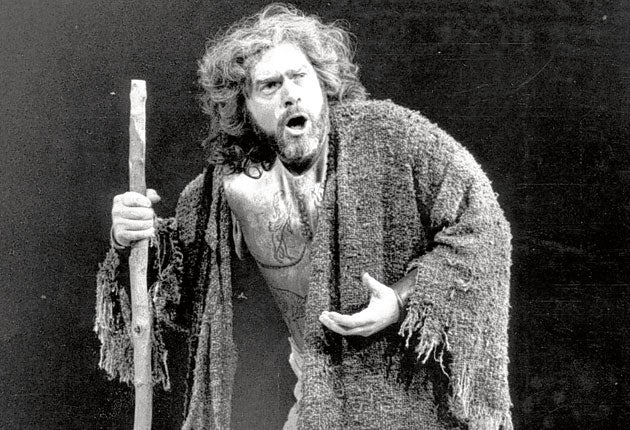Anthony Rolfe Johnson: British tenor who excelled in the works of Britten, Mozart and Monteverdi

Your support helps us to tell the story
From reproductive rights to climate change to Big Tech, The Independent is on the ground when the story is developing. Whether it's investigating the financials of Elon Musk's pro-Trump PAC or producing our latest documentary, 'The A Word', which shines a light on the American women fighting for reproductive rights, we know how important it is to parse out the facts from the messaging.
At such a critical moment in US history, we need reporters on the ground. Your donation allows us to keep sending journalists to speak to both sides of the story.
The Independent is trusted by Americans across the entire political spectrum. And unlike many other quality news outlets, we choose not to lock Americans out of our reporting and analysis with paywalls. We believe quality journalism should be available to everyone, paid for by those who can afford it.
Your support makes all the difference.The British tenor Anthony Rolfe Johnson was one of the finest exponents in his generation of the roles originally sung by Peter Pears in the operas of Benjamin Britten. However, his interpretations were in no way copies of the senior tenor's idiosyncratic versions; rather, they were recreations of the music that perfectly suited his own voice and style. His other favourite opera composers were Monteverdi and Mozart, while he sang the great Bach Passions and Handel oratorios throughout his career. As a recitalist he was a founder member of the Songmakers' Almanac and specialised in Schubert lieder and Britten's canticles. He also became an excellent conductor, especially of operas in which he had himself sung, such as Monteverdi's L'Orfeo.
Rolfe Johnson was born in Tackley, Oxfordshire in 1940 and though fond of singing from his childhood, he considered music a hobby and became a farm manager. Consequently, he did not start to seriously train his voice until his late twenties, when he entered the Guildhall School of Music and Drama. In 1970 he sang the title role in Mascagni's L'Amico Fritz and I wrote in Opera magazine that "Anthony Johnson's (sic) musical phrasing and smoothness of tone were a pleasure to listen to and in his aria… there was real dramatic feeling." Rolfe Johnson made his professional opera debut in 1973 with the English Opera Group, singing Vaudémont in Tchaikovsky's Iolantha, followed in 1974 by the first of his Britten roles, Albert Herring. He then sang at Glyndebourne for three summers, as Stroh in Strauss' Intermezzo, Lensky in Tchaikovsky's Eugene Onegin and Fenton in Verdi's Falstaff.
In 1978 he joined English National Opera and sang four Mozart roles in quick succession: Don Ottavio in Don Giovanni, Tamino in The Magic Flute, Belmonte in The Seraglio and Ferrando in Così fan tutte. For ENO he also sang in Monteverdi's L'Orfeo and the same composer's The Return of Ulysses – both of which were greatly admired – and two more Britten roles, the Male Chorus in The Rape of Lucretia and Essex in Gloriana. Meanwhile, in 1983, he had added another Britten title to his repertory: Aschenbach in Death in Venice, which he sang for Scottish Opera and in Geneva. He also acquired several Mozart roles during the Eighties, the Emperor Titus in La Clemenza di Tito at the Holland Festival; the title role of Lucio Silla at La Scala, Milan; and Idomeneo at the Aix-en-Provence Festival. In 1988 he made his Covent Garden operatic debut as Jupiter in Handel's Semele, having already sung there in the Britten War Requiem the previous year. He returned to the Royal Opera in 1992 as Oronte in Handel's Alcina.
Rolfe Johnson made his Metropolitan Opera, New York debut in 1991 as Idomeneo, returning in 1994 as Aschenbach. During the Nineties he sang Idomeneo at the Salzburg Festival, Shuisky in Musorgsky's Boris Godunov at Geneva and in 1994, his first Peter Grimes. Of all his Britten roles, Grimes was probably his finest; quite different from Pears or Richard Lewis or Jon Vickers, his characterisation was utterly gripping. He sang it for Scottish Opera, in Lisbon, at Glyndebourne, with the Covent Garden company in Palermo and in Savonlinna, Finland. His final Britten role was Captain Vere in Billy Budd, which he sang at a concert performance in Manchester in 1997. In 2000 he created Polixenes in Philippe Boesmans' operatic version of Shakespeare's The Winter's Tale in Brussels, repeating it in Lyon.
Elizabeth Forbes
Anthony Rolfe Johnson, recitalist, opera and concert singer: born Tackley, Oxfordshire 3 November 1940; married three times (three sons, two daughters); died London 21 July 2010.
Join our commenting forum
Join thought-provoking conversations, follow other Independent readers and see their replies
Comments